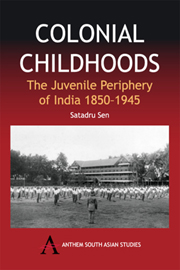Book contents
- Frontmatter
- Contents
- Dedication
- Acknowledgements
- Introduction
- 1 State of the Experiment: Experts, Parents and the Reformatory
- 2 The Nature of the Beast: The Content of Institutionalized Childhood
- 3 Experimental Childhoods: Pain and the Reformatory
- 4 Gendering the Reformatory
- 5 Masters and Servants: School, Home and Aristocratic Childhood
- 6 The Politics of Deracination
- Conclusion
- Notes
- Bibliography
- Index
5 - Masters and Servants: School, Home and Aristocratic Childhood
Published online by Cambridge University Press: 05 March 2012
- Frontmatter
- Contents
- Dedication
- Acknowledgements
- Introduction
- 1 State of the Experiment: Experts, Parents and the Reformatory
- 2 The Nature of the Beast: The Content of Institutionalized Childhood
- 3 Experimental Childhoods: Pain and the Reformatory
- 4 Gendering the Reformatory
- 5 Masters and Servants: School, Home and Aristocratic Childhood
- 6 The Politics of Deracination
- Conclusion
- Notes
- Bibliography
- Index
Summary
In the early 1860s, with the Mutiny still fresh in memory, British officers serving in the west and the centre of the subcontinent rediscovered princely India as a colonial frontier. This was, in fact, the discovery of overlapping frontiers — a geographic periphery, a cultural backwater and a political area of darkness. Each was remarked for conquest, and the instruments and sites of confrontation evolved over the following decades. Alongside the post-1858 durbar that McLeod, Ramusack and others have characterized as a new boundary between princely and British India, colonial administrators oversaw a network of educational institutions for the children of the princes. These schools — the Chiefs' Colleges, the Imperial Cadet Corps, relatively modest institutions for modest relatives, experiments in guardianship and tutoring — highlighted childhood itself as a live border in colonial India. The male child at the centre of these institutions was the point of entry into the adult world of political calculations, through which British viceroys, political agents and principals sought to bring about a more reassuring and pleasing colonial order.
The aristocratic native child did not enter these schools fully formed; his childhood, aristocracy and nature were all revealed by the school. This revelation could take place only within a set of experiments in institutional, political and racial order. The very act of revelation, therefore, indicated conquest and order, including possible and even impossible orders.
- Type
- Chapter
- Information
- Colonial ChildhoodsThe Juvenile Periphery of India 1850–1945, pp. 143 - 186Publisher: Anthem PressPrint publication year: 2005



